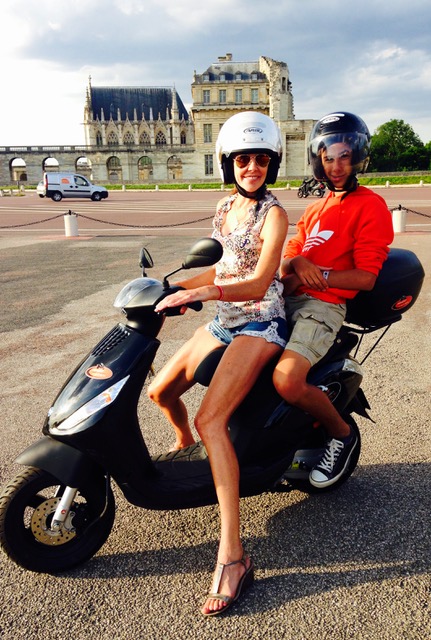
I’ve always been a doer—that is, trying to get as much done as possible each day at the expense of often feeling overwhelmed and stressed.
I recently took a month off to go back to France, where I’d lived for 15 years during my 20s and 30s. I’m currently in the south of France as I write this.
I woke up late yesterday, having indulged in numerous bottles of amazing wine with my friends here the evening before. I felt foggy and a bit hungover, so I skipped my morning meditation and my hour of writing.
I finally decided to go for a walk. About 20 minutes into my walk, I suddenly realized that the entire time, I’d been beating myself up for drinking too much, smoking a few cigarettes, going to bed late, not meditating or writing in the morning, and so on.
I literally came to a standstill as the realization hit me. Here I was in the most beautiful place, having a month to myself, and I was making myself miserable. My thoughts were causing me to feel guilty, worthless, and bad about myself.
I sat down and decided to figure it out.
Why was I doing this to myself? Instead of focusing on the fact that I’d had an amazing evening, laughed more than I have in a long time, and slept in, I was dividing my behavior into categories of good and bad—and I was worried about not getting enough done.
This is something I think that we likely all struggle with sometimes, especially as Americans. Our culture places so much emphasis on working more hours, accomplishing as much as possible, reaching specific goals at certain times in our lives, like graduating from college, getting a job, buying a house, finding a partner, and raising a family.
When we don’t reach these goals, we feel that we aren’t doing enough—and ultimately, that we aren’t enough. And yet, we continue to search for ways to do more in every part of our lives.
The question is, why? What does doing more give us? For me, in the beginning, it makes me feel more productive and accomplished—but in the end, all the doing leaves me feeling more stressed, overwhelmed, and inadequate.

I got up and continued my walk. I noticed the sounds of the birds and saw the beautiful colors of spring arriving in the countryside. I started walking slower and noticing more.
I realized that I was ruining my present moment by being in a space of guilt—and living in the past and the future. The present moment is all we actually have. It’s okay to want to do better, to be better, but not at the expense of losing the precious time that we have in the now.
How often do we spend large amounts of time planning how we are going to do better tomorrow and get more done? We spend so much wasted time on regrets, wanting things to be different, wishing that we could be different. But is there really anything wrong with the way we are? Human, perfect in our imperfection, not always consistent, but always trying.
And how often do we stop to acknowledge how much time we are wasting, how many moments and experiences we are missing out on, and how hurtful and damaging we are being toward ourselves.
I’ll tell you this, none of my French friends were beating themselves up with guilt about the evening before. They weren’t thinking about how they were going to drink less the next night, and then get up early to have time to get more done. They were just as tired as I was, but they were going about their day without guilt.
This is a major difference and something each of us could learn from: The French do not use guilt and shame to make themselves feel worse like we do in America.
I hear the phrase in France, “You only live once,” much more often than than the phrase, “I’m never doing that again.”
Most French people that I know well do not embody that “all or nothing” mentality that we have in the States and are raised with from a young age. Instead of being constantly focused on doing more, Europeans tend to focus more attention on slowing down. This is why they have a 35-hour work week, six to eight weeks of vacation each year (which everyone takes), and a leisurely two-hour lunch, followed by a few hours later where most of the shops are closed and people take time for a siesta. (Especially here in the south of France.)
What is wrong with approaching every day like this, I wondered. Absolutely nothing. In fact, it makes more sense in terms of better health, better relationships with others, and a better relationship with ourselves. Why do we, as Americans, always want to do more instead of trying to do less?
I looked at the feelings associated with doing more and doing less. Where does our need to feel busy, accomplished, and successful come from? And isn’t feeling stressed, overwhelmed, and never enough a very high price to pay?

What happens when we slow down?
We have more time to live in the present moment, to notice the beauty around us, to find things to appreciate and love about ourselves, and to connect with others and the world around us. By slowing down, we actually create more time in our lives. By accepting our behavior without labeling it as good or bad, we change the way we feel about ourselves.
I’m not saying we should go out every night and drink a ton of wine and sleep five hours, but I believe that we truly have the choice to look at our lives in a different way. We can choose to see how wonderful each moment of our experiences is, without feeling guilt or regret.
In the years I’ve spent here, each time I come back, it always takes me a few days to adjust. I feel out of place at first, and I now realize it’s because of how I am thinking about and looking at things. Then I start to remember the secret the French have to enjoying life, and it’s in remembering that, that I begin to soften and to feel at home again in this country I love so much. I also feel more free. I let go of my “all or nothing” thinking. I let go of my “all or nothing” behavior. I find moderation and balance. And I begin to focus on doing less instead of doing more.
This brings me into a place of calmness, clarity, and acceptance. I love myself more and forgive myself easily, and also have a much easier time accepting myself as I am, in this moment.
You don’t have to travel to Europe to try this. You just need to be aware of how your thoughts about your behavior are affecting the way you feel about yourself. Then it’s up to you to decide how you choose to feel about it. Ask yourself if it is worth beating yourself up and hating yourself over. Notice if you feel more peace and joy. More love and freedom. Less guilt, regret, and stress.
Life is too short not to appreciate every single beautiful moment it offers us.
We are all products of our environment and the society we live in. This applies to the way we do what we do and the way we think. But there is always a choice.
I have decided that when I return to the States, the most precious and valuable thing I can bring home with me is my new French mentality.
~
~
~
Author: Melissa Snow
Image: Author’s Own
Editor: Travis May






Read 0 comments and reply